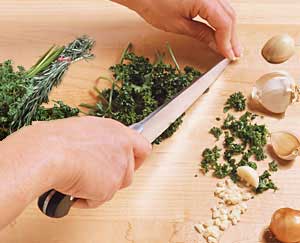health guides
Discover the Pleasure of Cooking with Fresh Herbs

Fresh herbs are creating a lush garden in today’s grocery stores. What was once limited to summertime is now available all the year round, and our meals are more tantalizing as a result. “Fresh herbs offer an astounding palette of vibrant and glorious tastes,” says Jerry Traunfeld. As executive chef of The Herbfarm Restaurant just east of Seattle, Washington, and a cookbook author, he’s received national praise for his innovative dishes showcasing herbs.
Keep them fresh and tasty
To get the most out of your herbs, try these storage and prep tips:
- Use fresh herbs as soon as possible to experience the fullest flavour.
- For storage, place unwashed herbs (so they’re dry) in resealable plastic bags and store in vegetable compartment of the refrigerator.
- Chop herbs coarsely or tear their leaves so it’s still possible to distinguish their unique characteristics (unless you’re using basil to make pesto; bay leaves added to soups and stews are left whole).
- Use the most aromatic herbs—thyme, rosemary, winter savoury, bay, and sage—in small amounts to test their effect on a dish’s flavour.
- Discard woody stems of herbs such as thyme and rosemary, but chop stems of parsley, dill, chervil, and cilantro and use them for cooking, too.
- Add fresh herbs to a dish only in the final few minutes of cooking so they don’t overcook and lose flavour.
- Work up to mixing herbs; it’s best to start by cooking with one at a time. Avoid combining two strong herbs, such as rosemary and sage, in the same dish, as the flavours will compete with each other and confuse the palate.
- When pairing a flavourful herb with a delicate one, use only a small amount of the stronger one so both flavours will come through.
- Substitute fresh herbs for dried herbs in recipes, but take their flavour differences into account: drying can concentrate a herb’s flavours so they can actually be stronger. For most recipes that call for dried herbs, use twice to three times the amount of fresh.
Make some terrific dishes starring fresh herbs
Discover the amazing versatility of fresh herbs in these recipes:
- Baked Rice with Fresh Herbs—parsley, thyme
- Bowtie Pasta with courgettes and Mozzarella—basil
- Chicken Linguini—basil
- Chilli Salsa Beef—cilantro
- Couscous Salad—mint, parsley, cilantro
- Crab Enchilada—coriander, parsley
- Fantastic Halibut—basil
- Garbanzo and courgettes Soup—basil, parsley
- Fresh Baby Spinach with Wild Mushrooms—tarragon, thyme, basil, marjoram
- Pork Tenderloin with Cilantro-Lime Pesto—cilantro
Learn more about fresh herbs
Choose herbs to blend, accent, or take centre stage when flavouring dishes. Trust your taste buds and experiment. Click on a specific herb to learn more about its personality: basil, bay leaves, chervil, coriander, dill, fennel, marjoram, mint, oregano, parsley, sage, savoury, tarragon, and thyme.
Copyright © 2024 TraceGains, Inc. All rights reserved.


 We are proud to announce that
We are proud to announce that  As the market evolves, customers increasingly request a wider variety of omega-3 options for their lipid...
As the market evolves, customers increasingly request a wider variety of omega-3 options for their lipid...  Maintaining healthy glucose levels is crucial for preventing metabolic conditions like diabetes,...
Maintaining healthy glucose levels is crucial for preventing metabolic conditions like diabetes,...  Looking at formulating a new vitamin blend? Discover
Looking at formulating a new vitamin blend? Discover 







































